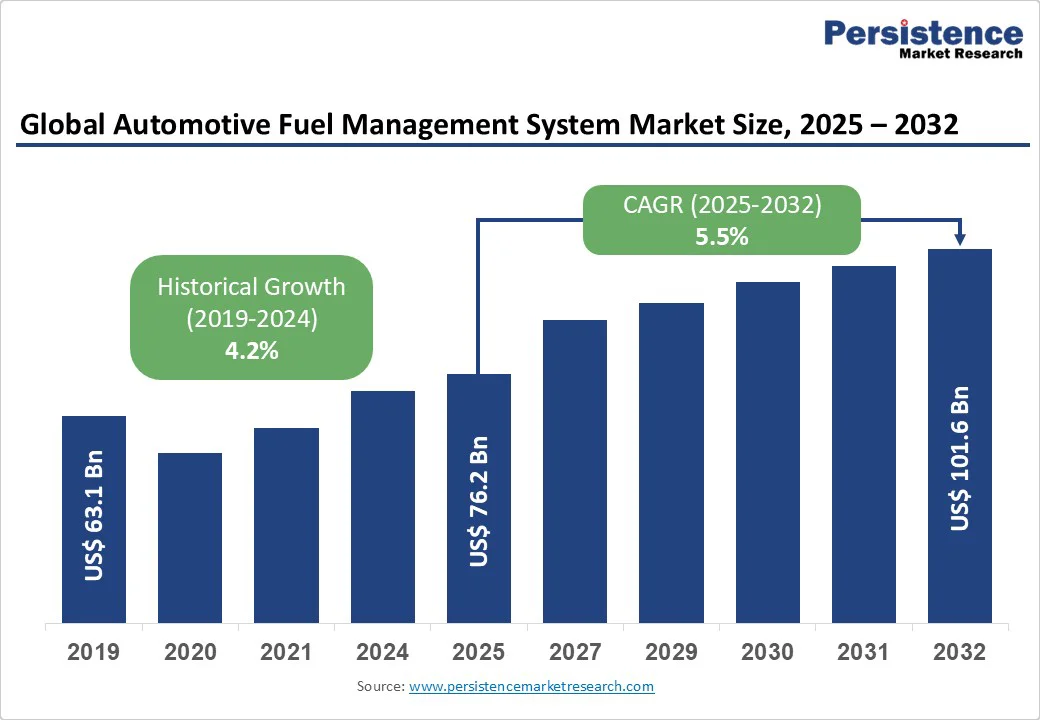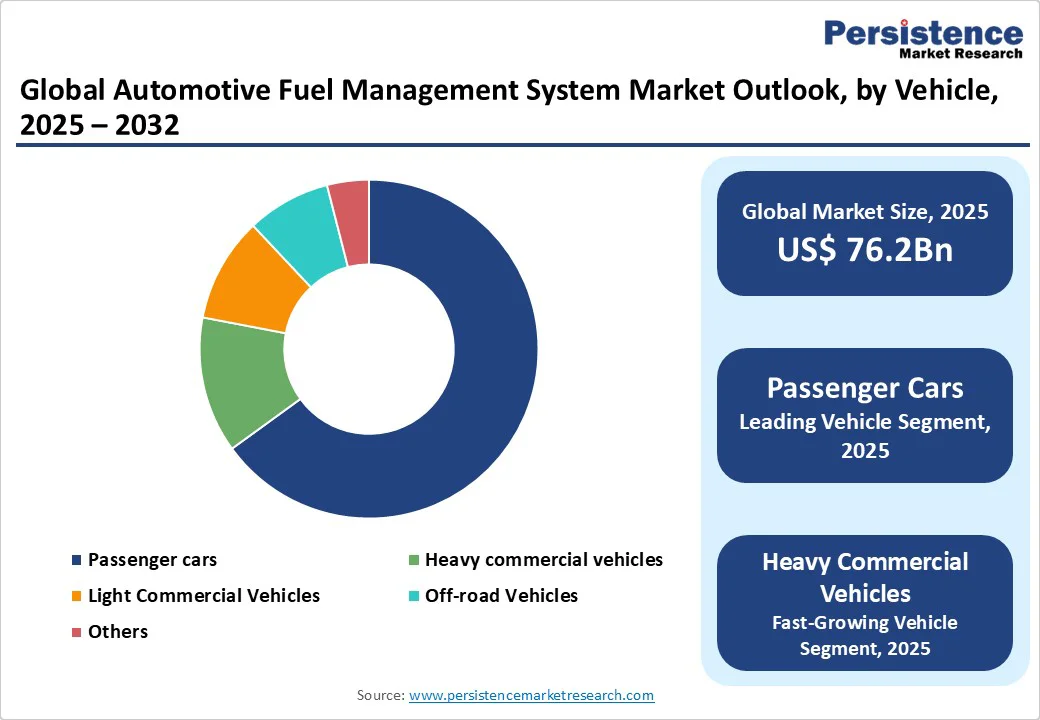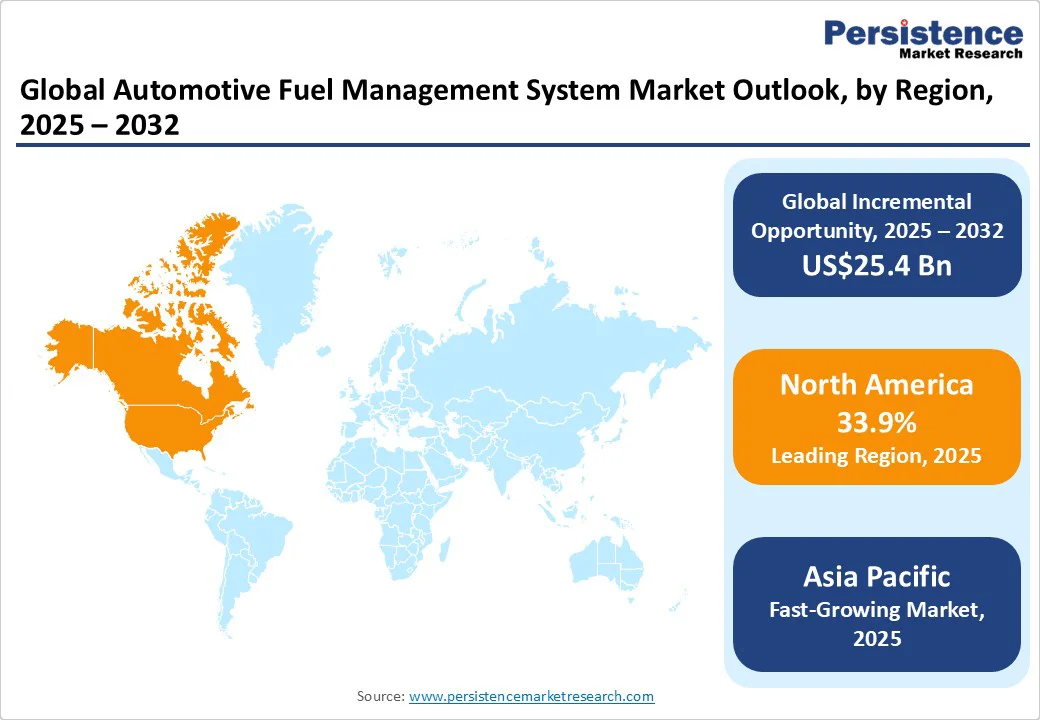ID: PMRREP26056| 183 Pages | 26 Sep 2025 | Format: PDF, Excel, PPT* | Automotive & Transportation

The global automotive fuel management system market size is likely to be valued at US$76.2 Bn in 2025 and expected to reach US$101.6 Bn by 2032, registering a CAGR of 4.2% during the forecast period from 2025 to 2032.
The automotive fuel market market has experienced robust growth, driven by the rising demand for efficient fuel utilization, advancements in engine technologies, and the increasing need for emission-reducing and performance-optimizing solutions.
| Key Insights | Details |
|---|---|
| Automotive Fuel Management System Market Size (2025E) | US$76.2 Bn |
| Market Value Forecast (2032F) | US$101.6 Bn |
| Projected Growth (CAGR 2025 to 2032) | 4.2% |
| Historical Market Growth (CAGR 2019 to 2024) | 5.5% |

The global surge in demand for fuel efficiency and emission compliance is a primary driver of the automotive fuel management system market.
According to the International Organization of Motor Vehicle Manufacturers (OICA), global vehicle production is increasing, with passenger and commercial segments showing significant growth, where fuel management systems play a critical role in optimizing fuel delivery, reducing consumption, and lowering emissions to meet standards such as Euro 7 and U.S. CAFE.
This rising demand, particularly in regions with high awareness of environmental trends and urban mobility, underscores the need for effective automotive fuel management systems, which provide precise control over air-fuel ratios, better engine performance, and compliance with regulatory mandates.
The automotive industry is increasingly adopting advanced management systems, which offer real-time monitoring and adjustments, driving formulation innovations. Consumers are showing a clear preference for efficient over conventional systems in vehicles, with an industry survey indicating that a majority of buyers prioritize fuel-saving technologies for cost reduction.
Automotive applications benefit from fuel management systems’ integration with advanced electronics, with growing recognition of their role in enhancing vehicle longevity and reducing operational costs, leading to steady growth in integrations.
In North America, rising regulatory pressures have strengthened demand for compliant systems, directly supporting the sector's expansion. Technological advancements in electronic control modules and sensors have also improved accuracy, making fuel management more accessible for various vehicle types and further fueling growth.
The industry encounters notable restraints primarily due to the high costs of production and resource dependence. Since fuel management systems rely on advanced components such as injectors and ECMs, their availability remains volatile and heavily influenced by fluctuations in semiconductor and raw material prices, resulting in inconsistent supply and unstable pricing.
This dependency creates challenges for manufacturers seeking reliable, large-scale sourcing. Furthermore, complex integration techniques such as calibration with engine systems require specialized tools and skilled professionals, adding to operational costs and creating barriers for smaller players with limited resources. These factors collectively restrict the ability of emerging companies to enter the industry.
In addition, stringent regulatory frameworks for emission standards and safety increase compliance expenses, particularly in regions where regulatory infrastructure is underdeveloped. Together, these challenges pose significant hurdles, slowing down widespread adoption and limiting the overall growth potential of the industry.
The automotive fuel management system market is witnessing strong opportunities driven by advancements in alternative fuel technologies and its growing versatility across multiple vehicle types.
The adoption of eco-friendly methods, such as hybrid-compatible systems and biofuel optimizations, not only reduces environmental impact but also enhances efficiency, making the production process more sustainable and cost-effective in the long run. These innovations are particularly valuable as consumer demand increasingly favors products that align with green mobility and low-emission trends.
Beyond traditional applications in internal combustion engines, it is gaining traction in emerging sectors. In off-road vehicles, it is being explored for rugged efficiency formulations, where its monitoring properties contribute to overall performance in harsh conditions.
Additionally, the incorporation of fuel management systems in hybrid and electric vehicle transitions offers manufacturers an avenue to differentiate and meet rising eco-conscious consumer preferences. Expanding market reach into untapped regions such as Latin America and the Middle East further amplifies growth prospects, providing companies with significant opportunities to diversify revenue streams and strengthen global presence.
The automotive fuel management system market is segmented into petrol, diesel, and others. Petrol accounts for nearly 55% of market share in 2025, driven by its cost-effectiveness, reliable scalability for passenger applications, and broad acceptance across consumer vehicles.
Diesel represents the fastest-growing segment, fueled by rising demand for fuel-efficient and high-torque systems in commercial vehicles. Its expanding adoption in heavy-duty and fleet applications highlights the shift toward cost-effective and durable solutions.
The automotive fuel management system market is segmented into passenger cars, light commercial vehicles, heavy commercial vehicles, and off-road vehicles. Passenger cars leads with nearly 65% of market share in 2025, attributed to its superior volume in consumer markets, cost-efficient upgrades, and flexibility in efficiency enhancements, making it highly suitable for urban and daily use.
Heavy commercial vehicles are the fastest-growing segment, supported by its fleet management benefits in fuel optimization and durability needs. Increasing demand for cost-saving solutions in logistics further drives adoption, positioning HCV systems as a key growth contributor.
The global automotive fuel management system market is divided into intake manifold, throttle body, air filters, fuel injectors, PCMs/ECMs, airflow meters, fuel filters, fuel pumps, and fuel tanks. Fuel injectors lead with a 40% share in 2025, driven by their widespread use in precise delivery applications.
PCMs/ECMs are the fastest-growing segment, driven by rising consumer demand for electronic control solutions. Their strong appeal lies in smart integration and performance versatility, making them a preferred choice in modern vehicle formulations.

North America dominates the global automotive fuel management system market, expected to account for 33.9% of market share in 2025. The region’s strong market presence is fueled by high levels of regulatory compliance and continuous innovation in efficiency products.
In the U.S., demand is particularly strong within passenger vehicles, where it is widely used for its emission-reducing and performance benefits. Rising concerns over fuel costs and environmental impact further strengthen the adoption of fuel management systems in fleet operations.
A notable trend shaping the sector is the shift toward integrated and smart systems, reinforced by regulatory support that emphasizes the use of low-emission technologies. Retail collaborations with leading suppliers and e-commerce platforms have also enhanced accessibility for consumers, contributing to broader adoption. Canada complements this growth by demonstrating increasing interest in commercial integrations and sustainable solutions, further solidifying North America’s position as a leader in the global market.
Europe maintains a significant position in the automotive fuel management system market, with Germany, France, and the UK emerging as the primary contributors to regional growth. Germany leads, supported by its extensive automotive production, which ensures consistent demand from the country’s robust OEM sectors. This advantage has enabled Germany to drive innovation in diesel and alternative applications, while also aligning with the European Union’s strong emphasis on emission reductions and sustainable ingredient use.
France follows closely, with rising consumer interest in efficient solutions strengthening the industry market for petrol and hybrid systems. The country’s growing demand for urban mobility further supports its position as a key growth hub. The UK contributes significantly as well, with multi-application use of fuel management across LCV and HCV categories. The country’s focus on fleet efficiency and regulatory compliance drives adoption and highlights its role in the regional market landscape.
Asia Pacific represents the fastest-growing region in the global automotive fuel management system market, with China, India, and Japan emerging as the primary growth drivers. China plays a leading role, supported by its extensive vehicle production capacities and rapidly expanding middle-class population that is increasingly investing in efficient and compliant products.
The country’s strong automotive industry provides a fertile ground for the use of fuel management systems in passenger and commercial vehicles. India is also witnessing significant growth, fueled by rising consumer awareness of fuel-saving technologies for cost reduction and emission control.
The integration of fuel management into hybrid formulations is further accelerating its adoption. Japan contributes substantially to regional growth through its well-established automotive sector, where the country’s tech-savvy population is driving demand for advanced ECM and injector systems. The strong emphasis on precision and clean mobility in Japan positions fuel management as a key ingredient in innovative vehicle solutions.

The automotive fuel management system market is highly competitive, with global and regional players striving for an advantage through product innovation, sustainable practices, and cost efficiency. The growing emphasis on multi-component formulations and compliance with strict regulations further drives rivalry. Strategic mergers, partnerships, and timely regulatory approvals serve as crucial differentiators, enabling companies to strengthen market presence and expand applications.
The automotive fuel management system market is projected to reach US$76.2 Bn in 2025.
Rising demand for fuel efficiency, technological advancements, and emission regulations are key drivers.
The automotive fuel management system market is poised to witness a CAGR of 4.2% from 2025 to 2032.
Innovations in alternative fuels and EV integrations present significant growth opportunities.
Omnitracs, LLC, E-Drive Technology, and The Veeder-Root Company are among the leading players.
| Report Attribute | Details |
|---|---|
| Historical Data/Actuals | 2019 - 2024 |
| Forecast Period | 2025 - 2032 |
| Market Analysis | Value: US$ Bn Volume: As Applicable |
| Geographical Coverage |
|
| Segmental Coverage |
|
| Competitive Analysis |
|
| Report Highlights |
|
By Fuel Type
By Vehicle
By Component
By Region
Delivery Timelines
For more information on this report and its delivery timelines please get in touch with our sales team.
About Author